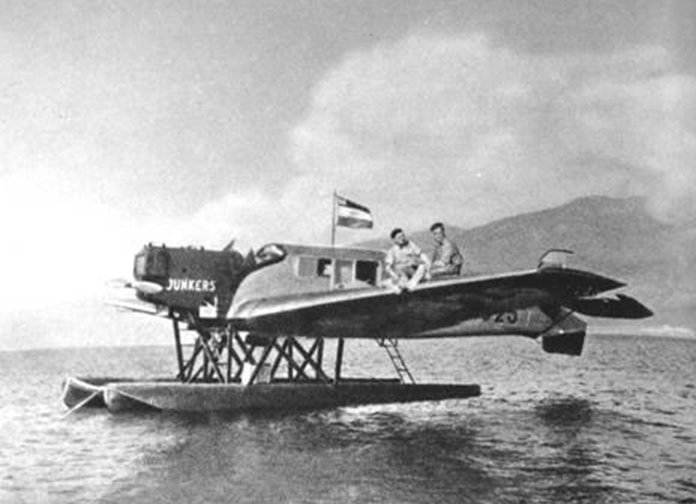333-Stranded in the Kimberley
Futility Closet
Greg Ross
4.8 • 748 Ratings
🗓️ 22 February 2021
⏱️ 33 minutes
🧾️ Download transcript
Summary

Crossing the world in 1932, two German airmen ran out of fuel in a remote region of northwestern Australia. With no food and little water, they struggled to find their way to safety while rescuers fought to locate them. In this week's episode of the Futility Closet podcast we'll describe the airmen's ordeal, a dramatic story of perseverance and chance.
We'll also survey some escalators and puzzle over a consequential crash.
Intro:
Winston Churchill had a confusing namesake in the United States.
Shelley's friend Horace Smith wrote a competing version of "Ozymandias."
Sources for our feature on the 1932 Kimberley rescue:
Barbara Winter, Atlantis Is Missing: A Gripping True Story of Survival in the Australian Wilderness, 1979.
Brian H. Hernan, Forgotten Flyer, 2007.
Anthony Redmond, "Tracks and Shadows: Some Social Effects of the 1938 Frobenius Expedition to the North-West Kimberley," in Nicolas Peterson and Anna Kenny, eds., German Ethnography in Australia, 2017, 413-434.
Frank Koehler, "Descriptions of New Species of the Diverse and Endemic Land Snail Amplirhagada Iredale, 1933 From Rainforest Patches Across the Kimberley, Western Australia (Pulmonata, Camaenidae)," Records of the Australian Museum 63:2 (2011), 163-202.
Bridget Judd, "The Unexpected Rescue Mission That Inspired ABC Mini-Series Flight Into Hell -- And Other Survivalists," Australian Broadcasting Corporation, Jan. 16, 2021.
Peter de Kruijff, "Survivalist Retraces Lost Aviators' Trek," Kimberley Echo, Jan. 29, 2018.
Michael Atkinson, "Surviving the Kimberley," Australian Geographic, June 28, 2018.
Erin Parke, "No Food, No Water, No Wi-Fi: Adventurer Tests Skills in One of Australia's Most Remote Places," ABC Premium News, Jan. 29, 2018.
"Forgotten Territory," [Darwin, N.T.] Northern Territory News, Feb. 28, 2016.
Graeme Westlake, "They Accepted Their Saviour's Fish and Ate It Raw," Canberra Times, May 15, 1982.
"German Fliers Got Lost in Our Nor-West," [Perth] Mirror, June 2, 1956.
"37 Days in a Torture Chamber," [Adelaide] News, April 21, 1954.
"Air Passenger," [Grafton, N.S.W.] Examiner, July 18, 1938.
"Hans Bertram," Sydney Morning Herald, July 16, 1938.
"Aviation: Pilot Bertram," [Charters Towers, Qld.] Northern Miner, April 20, 1933.
"Bertram Lands at Crawley," [Perth] Daily News, Sept. 24, 1932.
"Bertram's Marooned 'Plane," Singleton [N.S.W.] Argus, Sept. 21, 1932.
"Captain Bertram," Sydney Morning Herald, Sept. 20, 1932.
"Fully Recovered," Sydney Morning Herald, Aug. 6, 1932.
"The Search for the German Airmen," [Perth] Western Mail, July 21, 1932.
"The German Airmen," Albany [W.A.] Advertiser, July 7, 1932.
"Death Cheated," Cincinnati Enquirer, July 5, 1932.
"Lost German Fliers," [Adelaide] Chronicle, June 30, 1932.
"Search for Hans Bertram," [Carnarvon, W.A.] Northern Times, June 16, 1932.
"Strangers on the Shore: Shipwreck Survivors and Their Contact With Aboriginal Groups in Western Australia 1628-1956," Department of Maritime Archaeology, Western Australian Maritime Museum, 1998.
Listener mail:
"Escalator Etiquette," Wikipedia (accessed Feb. 8, 2021).
Brian Ashcraft, "It's Hard For Japan to Change Its Escalator Manners," Kotaku, June 20, 2019.
Jack Malvern, "Mystery Over Tube Escalator Etiquette Cleared Up by Restored Film," Times, Oct. 21, 2009.
Laura Reynolds, "11 Secrets of Harrods," Londonist (accessed Feb. 14, 2021).
Adam Taylor, "A Japanese Campaign Wants to Rewrite the Global Rules of Escalator Etiquette," Washington Post, Aug. 26, 2015.
Linda Poon, "Tokyo Wants People to Stand on Both Sides of the Escalator," Bloomberg City Lab, Dec. 20, 2018.
Johan Gaume and Alexander M. Puzrin, "Mechanisms of Slab Avalanche Release and Impact in the Dyatlov Pass Incident in 1959," Communications Earth & Environment 2:10 (Jan. 28, 2021), 1-11.
Robin George Andrews, "Has Science Solved One of History's Greatest Adventure Mysteries?", National Geographic, Jan. 28, 2021.
Nature Video, "Explaining the Icy Mystery of the Dyatlov Pass Deaths" (video), Jan. 28, 2021.
New Scientist, "The Dyatlov Pass incident, which saw nine Russian mountaineers die in mysterious circumstances in 1959, has been the subject of many conspiracy theories. Now researchers say an unusual avalanche was to blame," Twitter, Jan. 28, 2021.
This week's lateral thinking puzzle was contributed by listener Alex Baumans. Here are two corroborating links (warning -- these spoil the puzzle).
You can listen using the player above, download this episode directly, or subscribe on Google Podcasts, on Apple Podcasts, or via the RSS feed at https://futilitycloset.libsyn.com/rss.
Please consider becoming a patron of Futility Closet -- you can choose the amount you want to pledge, and we've set up some rewards to help thank you for your support. You can also make a one-time donation on the Support Us page of the Futility Closet website.
Many thanks to Doug Ross for the music in this episode.
If you have any questions or comments you can reach us at [email protected]. Thanks for listening!
Transcript
Click on a timestamp to play from that location
| 0:00.0 | Welcome to the Futility Closet Podcast, forgotten stories from the pages of history. |
| 0:15.0 | Visit us online to sample more than 11,000 quirky curiosities from corresponding Churchill's to an alternative |
| 0:21.8 | Azimandias. This is episode 333. I'm Greg Ross. And I'm Sharon Ross. Crossing the world in |
| 0:28.8 | 1932, two German airmen ran out of fuel in a remote region of northwestern Australia. With no |
| 0:35.3 | food and little water, they struggled to find their way to safety |
| 0:38.4 | while rescuers fought to locate them. In today's show, we'll describe the airmen's ordeal, |
| 0:44.4 | a dramatic story of perseverance and chance. We'll also survey some escalators and puzzle over a |
| 0:50.9 | consequential crash. |
| 1:03.1 | And just a quick programming note, we'll be off next week, so we'll be back with a new episode on March 8th. |
| 1:05.9 | At midnight, on May 15, 1932, a Juncker's J-U.W. 33 seaplane took off from Copang in Dutch Timor and headed southeast toward the Australian continent. |
| 1:18.9 | Aboard were two German airmen, pilot Hans Bertram, and mechanic Adolf Klausmann. |
| 1:24.7 | The two had departed that February from the Rhine near Cologne on a trip around the world |
| 1:29.7 | to find markets for the German aviation industry and make goodwill visits to German communities |
| 1:35.0 | along the way. The flight across the Timor Sea should have taken five and a half hours. Bertram and |
| 1:41.0 | Klausman had hoped to reach land at first light, but within an hour of take-off, |
| 1:45.6 | a wall of cloud loomed in front of them, a monsoonal storm. Bertram adjusted his course to avoid it, |
| 1:51.9 | but like almost all planes in that era, the Atlantis had no radio, so he had to make his own |
| 1:56.9 | judgment as to the wind's strength and direction. He seems to have misjudged this because at 6 a.m. |
| 2:02.9 | There was still no sign of land. They were running low on fuel when Klausman spotted a fringe of land |
| 2:08.4 | to starboard, and at 725 they sat down in a small inlet. There was no sign of human habitation. |
| 2:15.0 | Bertram wasn't sure whether they had reached the Australian mainland. |
| 2:18.6 | They had been short on time in Copang and had taken off without food or water, intending to have a |
... |
Please login to see the full transcript.
Disclaimer: The podcast and artwork embedded on this page are from Greg Ross, and are the property of its owner and not affiliated with or endorsed by Tapesearch.
Generated transcripts are the property of Greg Ross and are distributed freely under the Fair Use doctrine. Transcripts generated by Tapesearch are not guaranteed to be accurate.
Copyright © Tapesearch 2025.

